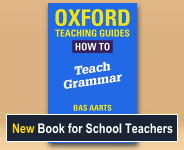Topic: National Curriculum
The 2014 National Curriculum Specifications for England are broken down by year and section to be easily navigable. This section also has links to Department of Education (DfE) information regarding forthcoming and published GPaS (SPaG) tests.
DfE content on our site is licensed under the Open Government Licence 3.0.
Englicious contains many resources for English language in schools, but the vast majority of them require you to register and log in first. For more information, see What is Englicious?

